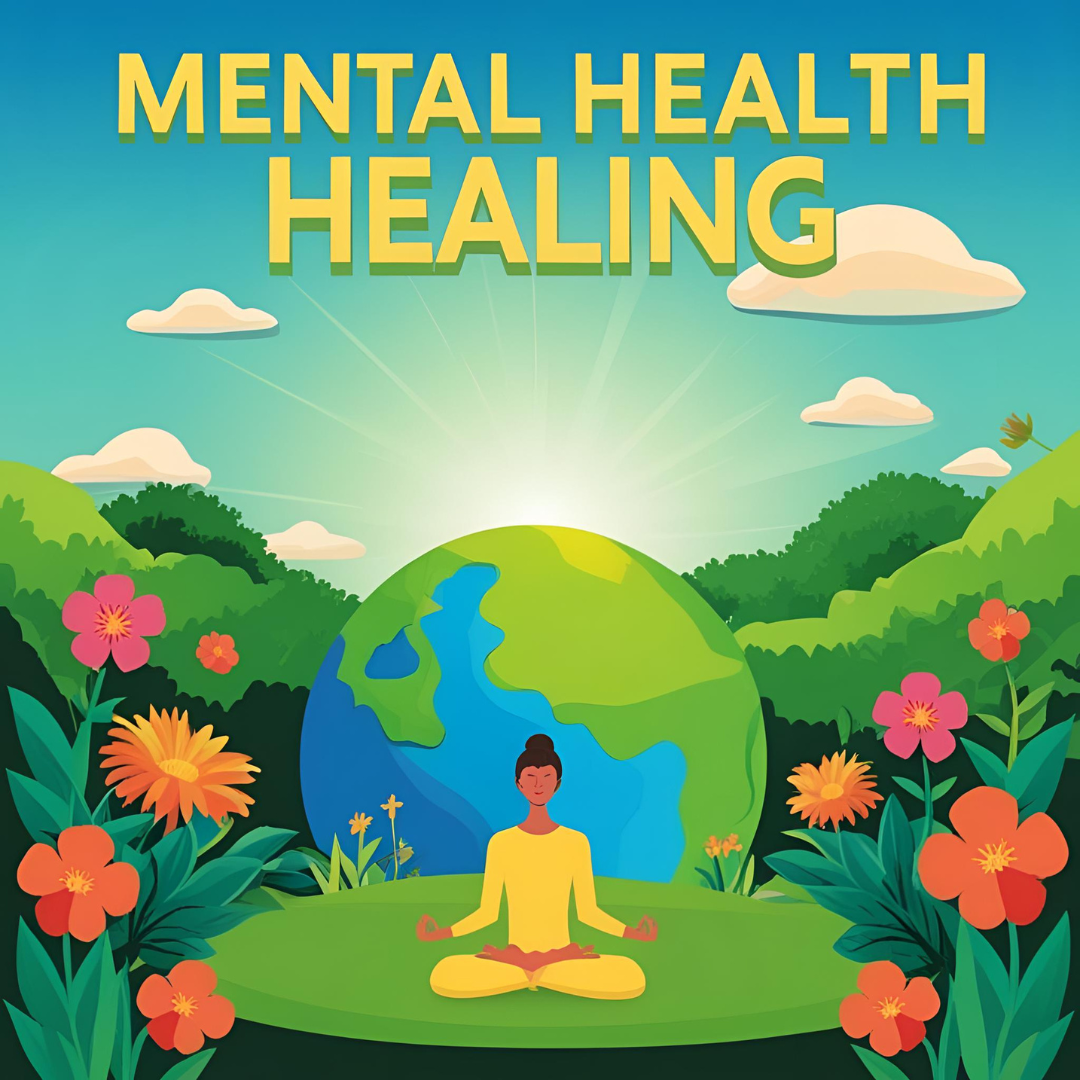Healing Minds by Healing the Planet: Practical Steps to Combat Environmental Stress and Restore Nature

Introduction
"Look deep into nature, and then you will understand everything better."– Albert Einstein
Once surrounded by lush greenery, today we find ourselves enclosed by concrete jungles—so much so that we often remain unaware of how the natural world around us is slowly eroding. What we fail to notice is how this environmental degradation directly impacts our mental health and the way we think. Hustling through our days, tethered to screens, we've forgotten how to connect with nature. Meanwhile, the quiet ease and calming presence of the natural world continues to pass us by.
Rising temperatures, polluted air, water scarcity, and diminishing green spaces not only strain ecosystems but our psychological well-being. The concept of "eco-anxiety" is now recognized globally, especially among younger generations. As our planet suffers, so do we.
But here lies a hopeful truth: the act of caring for the planet can be a powerful tool in healing ourselves. This article explores how healing the planet directly supports mental well-being, and outlines actionable steps to nurture both Earth and self.
- Nature and Mental Health: An Unbreakable Connection
The relationship between the environment and human psychology is deeply rooted in our biology and evolutionary history. For thousands of years, humans lived in close connection with natural rhythms—rising with the sun, depending on trees for oxygen and shade, and feeling the calming effects of rustling leaves and flowing water. It’s no surprise then, that nature profoundly impacts our mental health.
a. The Science Behind It
Studies in environmental psychology show that spending time in nature can reduce cortisol levels, lower heart rates, and increase feelings of happiness and vitality. Nature-based therapies like forest bathing (Shinrin-yoku in Japan), horticultural therapy, and eco-therapy are becoming increasingly popular for treating anxiety, depression, PTSD, and burnout.
Researchers from Stanford University found that walking in natural settings, as opposed to urban ones, decreases activity in the part of the brain linked to rumination—repetitive, negative thoughts associated with depression. Similarly, children raised in greener neighbourhoods have been shown to have lower rates of ADHD, improved cognitive development, and better emotional regulation.
b. Eco-Anxiety: A Modern Mental Health Crisis
However, as the climate crisis accelerates, a new kind of mental health condition has emerged: eco-anxiety. This refers to the chronic fear of environmental doom. While not a clinical diagnosis, it’s an increasingly common phenomenon, especially among climate-aware youth and environmental advocates. Symptoms include helplessness, grief, anger, and existential dread.
This psychological stress is compounded by a sense of powerlessness. When people feel they cannot influence change, anxiety worsens. But the inverse is also true—when people engage in climate action, their mental health improves. This means healing the planet isn’t just about saving future generations—it's about healing our present emotional selves.
2. Practical Ways to Heal the Planet and Your Mind
The good news? You don’t need to be an environmental scientist or move to the forest to make a difference. Small, intentional steps can contribute to the planet's recovery and bring mental peace. Here's how you can start.
a. Cultivate Green Habits at Home
Sustainable living practices not only reduce your carbon footprint but also instil a sense of purpose and mindfulness.
- Reduce, Reuse, recycle: Minimize single-use plastics, upcycle old clothes, and recycle consciously. These actions promote responsibility and reduce the guilt associated with consumption.
- Switch to Eco-Friendly Products: opt for biodegradable cleaning agents, organic skincare, and low-impact fashion. Making sustainable swaps often leads to greater intentionality in everyday decisions—boosting a sense of control and peace.
- Conserve Energy and Water: Installing energy-efficient appliances or using water-saving techniques contributes to larger planetary goals and reinforces your role in systemic change.
These daily practices bring alignment between values and actions, reducing cognitive dissonance and increasing self-worth.
b. Reconnect with Nature Mindfully
Reintroducing nature into your routine can act as a natural antidepressant.
• Forest Walks or Gardening: Even 20 minutes in a green space can elevate mood and energy. Gardening has shown to improve dopamine and serotonin levels, the chemicals responsible for happiness.
• Mindful Outdoor Activities: Practice yoga in the park, meditate by a river, or simply sit under a tree without distractions. These activities anchor you in the present and foster awe and gratitude.
• Digital Detox in Nature: Try a tech-free weekend surrounded by mountains or forests. This can reset your brain and reduce the sensory overload of modern life.
Studies show that people who regularly engage with nature report higher levels of self-esteem and life satisfaction—insights echoed by India's best psychologists, who often recommend nature exposure as a complementary practice for emotional well-being.
c. Participate in Community Environmental Efforts
Getting involved with others in nature-related activities fosters connection—one of the strongest protectors against mental illness.
- Beach or Park Clean-Ups: These offer a tangible way to give back to the Earth while building social bonds.
- Tree Planting Drives or Organic Farming: Acts like planting trees not only mitigate climate change but also provide a deep sense of legacy, growth, and hope.
- Support Local Environmental NGOs: Volunteering or donating to organizations working for reforestation, wildlife conservation, or climate justice increases feelings of contribution and empowerment.
Each action, no matter how small, serves as a ripple effect—improving your mood while improving the world.
3. The Emotional and Spiritual Rewards of Planet-Centred Living
Caring for the planet doesn’t just affect mental health—it touches the emotional and spiritual dimensions of human experience. There’s a certain soulfulness in sustainability, a connection that transcends utility.
a. A Sense of Belonging
When we live in harmony with the Earth, we begin to see ourselves not as separate from nature, but as a part of it. This perspective reduces existential loneliness, fosters interdependence, and nurtures empathy—for other species, for future generations, and for ourselves.
This belonging is especially healing for those who struggle with anxiety, depression, or identity crises.
b. The Power of Purpose
Living a planet-conscious life gives people a mission. Whether it’s going zero waste, composting, or advocating for climate justice, these actions create a purpose beyond self. Having a higher purpose is often linked to increased happiness, resilience, and longevity.
Even in the face of global crises, those who act with purpose feel less helpless. They become part of the solution—and that hope is powerful medicine.
c. Awakening Mindfulness and Gratitude
Nature has a way of inviting us into stillness. Watching a sunset, feeling rain on your skin, listening to the rustle of leaves—these moments reconnect us to what really matters. They awaken awe and gratitude; emotions scientifically proven to lower inflammation and improve emotional resilience.
Gratitude toward the Earth can slowly transform into gratitude for life itself. It shifts focus from what’s lacking to what’s already abundant—a deeply therapeutic mindset.
Conclusion
The climate crisis is one of the most pressing challenges of our time. But it’s also a mirror—reflecting our disconnection from nature, from each other, and from ourselves. Healing the planet isn’t just an environmental duty—it’s a mental health necessity.
By choosing to reconnect with nature, adopt sustainable practices, seek support through tools like virtual therapy, and support environmental causes, we don't just protect our world—we protect our minds. Nature is not just a backdrop to our lives; it’s the very source of our balance and well-being.
As we tread the path toward healing the planet, we discover that the journey inward is just as important. For in healing the Earth, we begin to heal ourselves—one mindful step at a time.
Sources
WHO: Mental Health and Climate Change – A comprehensive WHO report on how climate change affects mental health, including eco-anxiety.
Nature Contact Boosts Self-Esteem – Nature.com – Report on how regular nature contact improves life satisfaction and lowers stress.
Forest Bathing & Nature Therapy – NCBI – Evidence supporting Shinrin-yoku (forest bathing) as a tool for stress reduction and mental restoration.

Ms Sonali Sikdar
Throughout my working life, I have been involved in enabling people to grow and change. Empowering them with newer opportunities to evolve themselves and build their career around their inner calling.
Related Blogs
No related blogs available.

